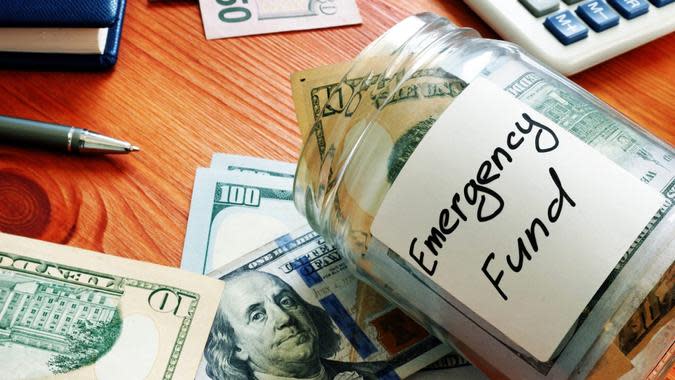50 Top Money Tips From Suze Orman To Apply to Your Finances Today

Money mastermind Suze Orman achieved wealth without a silver spoon to get her started.
Learn More: Suze Orman: 5 Social Security Facts Every Soon-To-Be Retiree Must Know
Find Out: How To Get $340 Per Year in Cash Back on Gas and Other Things You Already Buy
She didn’t come from money and managed to morph an ordinary career in waitressing to an astronomical one in personal finance. She worked and continues to work hard. And now, at 72, Orman boasts a net worth of $75 million. As she amasses wealth, she continues to share her hard-earned money advice.
Orman has dozens of practical tips that anyone can apply to their finances at any time. Here’s a look at 50 of her top tips.

Free Yourself From Shame
In a post on Oprah.com, Orman explored how to get a financial fresh start, and highlighted that the first step in doing so is to free yourself of shame — a move that may be tougher than you’d think.
“The first, and most difficult, step is to absolve yourself and your spouse or partner of any guilt,” Orman wrote.
“So, you need to make a promise to me. I need you to agree that the past is past, and we are going to focus on the future. Whatever mistakes you feel you have made with money, whatever moves you wish you had or hadn’t made, are irrelevant. We are free to move forward only when we remove the emotional shackles of regret.”
Read Next: Mark Cuban Reveals Why He Keeps a Strict Budget Everyday
Be Aware: Barbara Corcoran Says, ‘Forget About Florida,’ Move Here for Cheap Homes

Get a Full Picture of Your Finances
In the Oprah.com blog, Orman asserted that it’s impossible to map out a route to your destination if you don’t know where you’re starting from.
The same goes for money. You need to take a “before” picture of your finances before you can revamp them.
“You’ve heard me say this a million times, but I want you to open every single financial statement — bank, credit card, mortgage, 401(k), brokerage account — and take a look,” Orman wrote.
“Only when you have everything in front of you can you set priorities about what to do next.”
Try This: Robert Kiyosaki: 7 Ways To Become Wealthy Beyond the 9-to-5

Use Online Banking
If you’re not already enrolled in online banking, get on it; Orman’s orders.
“It should be free, and as long as you use your home computer, it’s also safe,” Orman wrote on Oprah.com.
“The advantage of online banking is that you can pay bills superfast, and your account is automatically credited or debited for each deposit and payment, making it easier to stay on track.”

Get Life Insurance
If you have anyone financially relying on you in any capacity, you need life insurance.
“For the vast majority of us, term life insurance is all we need, because it protects you for the ‘term’ of the policy (from five to 30 years) and is incredibly inexpensive,” Orman said in the Oprah.com blog.
“As always, it’s important to buy a policy from a firm with a strong financial rating, but even if an insurance company runs into trouble, your state insurance department has funds set aside to help protect you.”

Always Know Your Credit Score
Credit scores fluctuate. It’s crucial that you’re always in the know of where yours stands. You’ll need good credit for good loans.
“The big takeaway from the meltdown of 2008 is that banks are going to be a lot less eager to lend money to you,” Orman penned on Oprah.com. “You will need a sparkling financial personality — a FICO score above 700, solid verifiable income, a manageable amount of existing debt — to get good offers for credit cards, auto loans, mortgages and refinancings.
“And you can expect lenders to continue to tighten the screws on your existing credit lines; all the credit they loved to give you before 2008 now makes them nervous.”

Make an Ample Emergency Fund (At Least 8 Months)
Typically, financial experts recommend that you have an emergency fund that covers at least three to six months of living expenses. Orman has a longer timeline in mind.
“Every family should have an emergency savings account that can cover at least eight months of living expenses,” she said on Oprah.com.
Check Out: Robert Kiyosaki: 5 Side Hustles You Can Work From Anywhere in the World

Get Fit
If you want to live rich, live healthy.
Recognizing the virtue of health, Orman penned on her blog, “It doesn’t matter how old you are right now. We can all make a plan to be kinder to our bodies. Maybe it’s working up to a 30-minute walk each day. Or moderating our intake of whatever comfort food is our weak spot.”

Ditch the Pricey Coffee Habit
Mmm, those handcrafted lattés! They’re so great until we see the financial toll they take. Orman firmly shakes her head against those luxurious sprees in the name of caffeine.
“You need to think about it as,” Orman said. “You are peeing $1 million down the drain as you are drinking that coffee. Do you really want to do that? No.”

Separate Money for Savings from Money for Investing
If you want your money to work as hard as it can for you and your family, take a note from Orman and separate your money for savings from your money for investments.
“There is a vitally important difference between money you need to save and money you need to invest, yet it’s a distinction many people don’t grasp,” Orman wrote on Oprah.com.
“Money you know you need or want to spend in the next few years is savings. Money you keep handy for an emergency belongs in savings. Money you hope to use soon for a down payment on a house belongs in savings. And all savings belong in a low-risk bank savings account or money market account. The goal is to keep your money safe so that when you go to use it, it will be there.”
Orman also explained how to designate money for investing.
“Money you won’t need to use for at least seven years is money for investing,” she penned. “The goal here is to have your account grow over time to help you finance a distant goal, such as building a retirement fund. Since your goal is in the future, money for investing belongs in stocks.”

Evaluate Spending Patterns To Save More
“When I suggest that people send in more money to pay off credit card balances or increase the amount they save each month for retirement, I hear the same sad story,” Orman penned on Oprah.com.
“‘Oh, Suze, I would if I could, but I can’t because there’s no extra money left at the end of the month.’ I beg to differ. There’s no money left because you haven’t evaluated your spending habits. You need to dig deep and be willing to change those habits; to set goals and use those goals as the motivation for lifestyle changes that will allow you to save and invest.”
For You: Shark Tank’ Star Kevin O’Leary: My Morning Habit That Keeps Me From ‘Losing Money 100% of the Time’

Pay Off the Costliest Debts First
Like many other financial experts, Orman recommends paying down the costliest credit card balances first.
“When the first card is cleared, direct your payments to the card with the next highest interest rate,” Orman wrote on Oprah.com. “Keep doing this until you’ve zeroed out the balances on all your cards.”

Open a New Checking Account, If Necessary
Another tip for a financial fresh start that Orman shared with Oprah.com applies to your checking account.
“If you’re vexed by your checking account (you swear you should have more money; you can never figure out why your checks bounce), start fresh by opening a new one,” Orman said. “Leave enough in your existing account to cover any checks that haven’t yet been processed, then transfer the rest to the new account and close the old one.”

Make 2024 the Year To Pay Off Credit Card Debt
Credit card debt has a way of hanging over our heads year after year, only becoming heavier and harder to navigate. Make this the year you resolve to finally tackle it.
“Doing so will make you and your family stronger and happier — forever,” Orman wrote on Oprah.com.
“What happens to the stock market and the housing market is completely beyond your control. Credit card debt, however, is completely within your control. Every time you pay off a card with a 15% interest rate, you get a 15% return on your money.”

See If You Qualify for a Low Balance Transfer Card
“See if you can qualify for a balance transfer card that offers a low or 0 percent introductory interest rate for the first six to 12 months,” Orman penned on Oprah.com.
“If you can get a good deal, move your high-rate debt to that new card. Do not use the card for any new charges, and push yourself hard to pay off the balance as soon as possible. If you don’t qualify, no worries. Always pay the minimum due on each card, on time, every month.”
Discover More: 6 Reasons the Poor Stay Poor and Middle Class Doesn’t Become Wealthy

Find ‘Hidden Money’ in Your Credit Card Statements
Another masterful tip to apply to your finances today, according to Orman’s writings on Oprah.com, is to carefully scour recent credit card activity. You’ll likely find savings opportunities therein.
“Take a clear-eyed look at your credit card statements for the past six months,” Orman said. “Can you really tell me that there isn’t at least $50 or $100 showing up that you could easily do without? I didn’t think so. I call this ‘hidden money.'”

Reduce Your Monthly Utility Bills by 10%
Millions of Americans are struggling with the rising costs of utilities, but if you’re crafty, you can cut costs here, too.
“I challenge you to reduce every one of your monthly utility bills by 10%,” Orman wrote on Oprah.com. “Change your calling plan or get rid of the landline account unless you absolutely need it. I bet you can seriously trim your utilities by spending one afternoon increasing your home’s energy efficiency —
“Attach a draft-blocking guard to the bottom of any external doors; add caulk or weather-proofing material around drafty windows; put low-flow aerators on your shower heads and faucets; and replace burned-out bulbs with compact fluorescent energy savers (they’re pricier than conventional bulbs but last much longer, saving you money over the long term).”

Consider Buying a Used Car
Who among us wouldn’t prefer a shiny new car over a less sparkling used alternative? It may not be what we want, but often a good used car is what we need (for our financial health).
“Consider buying a used or certified pre-owned car rather than a brand new one,” Orman wrote on Oprah.com. “If you get a three-year loan, you have plenty of life left in your car, and money that once went to car payments is freed up for other financial needs.

Plan on Driving Your Car for At Least 7-10 Years
“Plan on driving yours for at least seven to 10 years (regular tune-ups will help keep it running longer),” wrote Orman on Oprah.com.
Learn More: 4 New Cars To Reconsider Buying — and 4 Cheaper Alternatives

Never Lease a Car — and Reduce Auto Insurance Premiums
“Plan on driving yours for at least seven to 10 years (regular tune-ups will help keep it running lon
On that car-related note, Orman urges Americans looking for financial health to avoid leading cars. She also has tips on reducing auto insurance premiums.
“Since you don’t own the car, you never have a time when you are driving your car free and clear,” Orman wrote on Oprah’s site. “Also, raising your deductible or designating one car to be used for low-mileage driving (under 15,000 miles a year) can reduce your insurance premiums by 15 percent or more.”

Build a Retirement Plan the Right Way
We all need to be aggressively saving for retirement, and we can only start doing that by having a concrete plan in action. Here’s what you should be doing in order to do it right, according to Orman’s post on Oprah.com.
“If your 401(k) and Roth IRA lost value in 2008, that’s a good sign. It means you were invested in stocks, and that’s exactly where you should be invested — assuming your retirement is at least a decade away,” Orman wrote.
“Only stocks offer the chance of high returns that outpace the annual 3 to 4% inflation rate. In your 20s and 30s, aim to keep 80% in stocks and just 20 % in bonds; you have time to ride out stock swings.
“As you age, slowly ramp up the percentage in bonds; in your 50s and 60s, consider keeping 40 percent or more in bonds to help buoy your portfolio when stocks are slumping. The biggest mistake you can make is to stop investing in your retirement accounts or to shift money from stocks into ‘safe’ money market accounts.”

Invest for the Long Haul
Like Warren Buffett, Orman advocates for sticking with your (diversified) stock market investments through the ups and downs.
“Here’s some perspective: The 2008 market slide is the tenth bear market (commonly accepted as a decline of at least 20%) since 1950,” Orman penned for Oprah.com.
“If you’d put your money in stocks in 1950 and stayed invested through the ups and downs, your average annual return through 2007 would have been more than 10%. That’s not to say you can count on an average of 10% over the next 50 or so years (7 to 8% is probably more realistic), but it illustrates how keeping focused on the long term pays off.”

Don’t Fret When Your Retirement Account Dips
It’s easy to get at least a little flustered when you see your retirement account is dipping, but don’t panic.
“Instead of worrying that your account is down, remember that your money buys more shares of your retirement funds,” Orman penned on Oprah.com. “The more shares you own now, the more you will make when the market recovers. Buy and hold is the way to go.”
Check Out: Here’s Exactly How Much Savings You Need To Retire in Your State

Diversify Your 401(k)
Any financial expert worth her salt will insist that you diversify your asset allocation, and Orman is no exception. She recommends you try to reduce stock you own in your 401(k) to under 10% of your total retirement assets.
“Just ask employees of Enron, Bear Stearns, Merrill Lynch and Washington Mutual how smart it was to make big bets on their own stock,” Orman penned on Oprah.com. “Mutual funds and exchange-traded funds (ETFs) are ideal for retirement savings because they own dozens of stocks in their portfolios.”

Look for a ‘Target Retirement’ or ‘Life Cycle’ Fund
“If you’re flummoxed by all the investing options in your 401(k), look for a ‘target retirement’ or ‘life cycle’ fund,” Orman wrote for Oprah’s site.
“Then pick the specific portfolio that dovetails with your expected retirement age and you’re all set; you will be invested in a mix of stock and bond funds appropriate for your age. You can also invest your Roth IRA in these types of funds; Fidelity, T. Rowe Price and Vanguard all offer these one-and-done options.”

Don’t Obsess Over Your Home’s Value
“If you’re flummoxed by all the investing options in your 401(k), look for a ‘target retirement’ or ‘life cycle’ fund,” Orman wrote for Oprah’s site. “Then pick the specific portfolio that dovetails.”
The housing market is naturally mercurial and though it’s smart to buy and renovate with the intention of your home’s value going up, Orman says not to obsess over this issue.
“Unless you bought at the height of the market in a super-popular region that has gone Ice Age-cold, you’re going to be fine,” Orman penned on Oprah.com. “And even if you did buy at the peak, if you plan on staying put for five to 10 years, the real estate market will recover with time.”

Don’t Make Your Home Your Fund for Retirement or Vacations
If you’re fortunate enough to own a home that you can afford, don’t take it for granted by thinking of your abode as your nest egg.
“A home is not an investment that will fund your retirement or vacations,” Orman wrote on Oprah.com. “The 10 or 20% annual gains during the housing boom were temporary insanity. Buy a house you can really afford, and over time it will rise in value. But its main value is as a home. Period.”
Be Aware: 7 Ways People Destroy the Value of Their Homes, According to a Real Estate Agent

Talk To Your Mortgage Lender About Options Instead of Raiding Your Retirement Funds
Did you get trapped buying a home during the housing bubble and are now in mortgage trouble? On Oprah.com, Orman shared a tip for dealing with this, along with a cautionary note.
“Talk to the lender about your options,” Orman said. “Don’t raid your retirement accounts to keep up with the payments. What happens when the retirement accounts run dry? You still won’t be able to cover the mortgage, and you will have lost all your future security.”

Women! Get Your Own Personal Savings Account
“And I also want every woman to have her own personal savings account that could support her for at least three months, because you never know,” Orman wrote for Oprah. “The best place for your savings is an FDIC-insured bank (or a credit union backed by the National Credit Union Share Insurance Fund).”

Keep No More Than $100,000 in Any FDIC-Insured Bank
Orman noted in her post on Oprah.com that the FDIC insurance limit is $250,000, but adds: “To be extra safe, keep no more than $100,000 in any single bank.”

Prioritize Needs, Not Wants
Between rising costs of living and inflation, many of us are stretched thin these days and cornered into living paycheck to paycheck. The trick to getting out of this trap is to live within your needs but below your means. You can do this by prioritizing needs over wants.
“Every time you go to spend money, you ask yourself the question, ‘Is this a want or is this a need?'” Orman told CNBC. “If it’s a want, do not buy it,” Orman said.
Try This: 5 Frugal Habits of Mark Cuban

Stop Paying Extra for Minor Conveniences
When asked about the cost of little splurges like fancy coffees and avocado toast during a CNBC Power Lunch several years ago, Orman was quick to point out that these costs add up quickly.
“Stop leasing cars, stop eating out, stop doing the things that’s wasting your money and makes your life easier, because in the long run it’s going to make it harder,” Orman said.

Pay With Debit Instead of Credit Whenever Possible
Credit cards are sort of like tickets to debt. Given this, Orman recommends opting for cash or debit instead of credit cards. This hack is particularly useful if you’re already in debt.

Say No to Reverse Mortgages in Your 60s
When retirement is nearing, you may be feeling pressure to ramp up your savings, pronto. But you should rethink reversing your mortgage in this time of your life.
“If you tap all your home equity through a reverse at 62 and then at 72 you realize you can’t really afford the home, you will have to sell the home,” Orman said, as quoted by The Motley Fool.

Delay Collecting Social Security
You’re eligible to begin collecting Social Security benefits at the age of 62, but you can better prosper by waiting.
“From a financial standpoint, if you do live a long life, waiting as long as possible to start collecting Social Security will pay off with higher lifetime benefits,” Orman said on her blog.
Trending Now: These 8 Expenses Can Kill Your Retirement — Should You Ditch Them ASAP?

Pay Off All Debts Before You Retire
Heading into retirement with a boatload of debt all but guarantees a sinking ship. Why be dragged down during a time when you’re supposed to be finally fully enjoying life? Pay off all debts before you reach your golden years.
“Debt is bondage,” Orman told CNBC. “You will never, ever, ever have financial freedom if you have debt.”

Put Retirement Before College
Nobody is arguing that college isn’t important, but you shouldn’t make it more important than retirement. In Orman’s opinion, a safe and secure retirement should be your first priority between the two.
“There is no circumstance where it is smart, or even okay, to put college costs ahead of retirement,” Orman wrote on her blog.

Work with a Financial Advisor Who Holds Themselves to the Fiduciary Standard
A financial advisor can help you get to a place of financial security and freedom. Get one — but vet them first. Make sure they hold themselves to the fiduciary standard.
“The good news is that there are plenty of advisors who indeed hold themselves to the fiduciary standard,” Orman said on her blog. “And they will likely make it a big point on their website or their marketing material.
“That said, the first step if you are interviewing potential financial planners is to ask them if they are a fiduciary and if they will put that in writing if you work with them. This should be a super easy request anyone will quickly say yes to.”

Consider Rolling Over Your 401(k) — But Be Smart About It
“A [401(k)] rollover can be a smart move,” Orman said. “But only if you make smart decisions.”
If you opt to do a rollover, Orman highlights one simple way to make sure you keep your costs as low as possible: “Invest your rollover IRA in low-cost index mutual funds or exchange-traded funds (ETFs),” she said on her blog.
For You: 9 Strategies Americans Are Using To Minimize the Taxes They Pay on Retirement Savings

Lock In a Guaranteed High Return
Want to make your money make money? Lock in a guaranteed high return.
“Right now, the smartest move you can make is to lock in a safe return of 5% or more for the next year to 18 months,” Orman said on her blog. “And I mean right now! If you wait or file this away as something you’ll get to when you have the time, you are going to miss the chance to get paid a guaranteed 5%.”
A great way to lock this rate in is by opening a CD account stat.

Don’t Fall for Trendy Stocks
All investors need to be vigilant, but new investors should be especially so. Orman told CNBC that the biggest mistake she sees young investors make is buying stock in a company because it’s cool or trendy.
“Maybe you’ll hit it right, maybe you’ll hit it wrong,” Orman said.

Say No To Co-Signing A Loan
Orman told CNBC that it’s a bad idea to co-sign a loan — even if for a dear friend or beloved family member. It’s a bad idea because if they’re late in paying, or default, you’re financially responsible and will take a hit.

Pay Your Student Loans on Time
It’s so very important to pay all your bills on time — and don’t forget your student loans.
“Make paying back your student loan the very first bill you pay,” Orman wrote on her Facebook page.
“It is more important that you make your student loan payments on time each month than any other [bill]. Student loans are the one debt that by law cannot be wiped out in bankruptcy.”
Explore More: This Is the One Type of Debt That ‘Terrifies’ Dave Ramsey

Automate Your Savings
The best way to save is to make it something you don’t even have to think about every month. To do this, take Orman’s advice and automate your savings.

Lower the Fees You Pay on Investment Funds
“If your portfolio is full of investments that charge 1% or more, I am telling you that the best move to make today — and that will pay off for the rest of your life — is to focus on lowering your costs,” Orman wrote in a blog post.
“Paying less in fees means keeping more of your money growing for your future. And that’s extra important for the times when market returns are low, or even negative.”

Don’t Spend Your Way into Debt
Orman is fed up with people amassing credit card debt by overspending.
“If you can’t afford to pay off a credit card in full, then that is money that shouldn’t be spent,” she said in a blog post.

Know When To Say No
Just as you need to know when to say no when you, say, don’t have the bandwidth to take on more work, you need to know when to say no to someone you love asking for financial help.
“The truth is that no one can afford to lend a buck if it means going into debt,” Orman wrote on Oprah.com. “Even if you do have money to spare for relatives who ask you for funds, consider it a loan, not a handout. Letting the borrower know that you expect repayment — and working out a plan that sets boundaries for both of you — may make him or her reconsider asking in the first place.”
Try This: You Can Get These 3 Debts Canceled Forever

Make Yourself a No.1 Priority
“You have to make yourself a No. 1 priority,” Orman told CNBC.
This means focusing on your financial goals both for the present and the future, and always making money moves that protect and strengthen your position in life.

Be Generous to Yourself
Just because you’re living frugally and wisely, doesn’t mean you can’t live generously. In fact, you can reframe this picture and think of living below your means as a way of showing yourself generosity.
“I want you to keep this in mind when you are tempted to spend money you can’t really afford to spend,” Orman said. “When you are pondering a purchase, stop for a moment and ask yourself, ‘Is this generous to me? Or will it hurt me financially?'”

Consider Your Longevity (It May Be Longer Than You Think)
Americans are living longer, healthier lives. This is great news! But there’s a caveat: We may not be saving enough to cover our lengthier retirement. Orman recognizes this, which is partly why she recommends delaying Social Security benefits.

Get Your Estate Plan Papers in Order
Hopefully you’ll live a very long and healthy life. But you need to be prepared, sooner than later, for how your assets will live on after you pass.
“I want you to get your estate papers in order,” Orman wrote on Oprah.com. “You should have a living revocable trust (this document spells out how your assets should be distributed) with an incapacity clause, as well as a will. Also, have an ‘advance medical directive’ in place that tells your doctors the type of care you want if you become unable to speak for yourself.”
More From GOBankingRates
This article originally appeared on GOBankingRates.com: 50 Top Money Tips From Suze Orman To Apply to Your Finances Today
